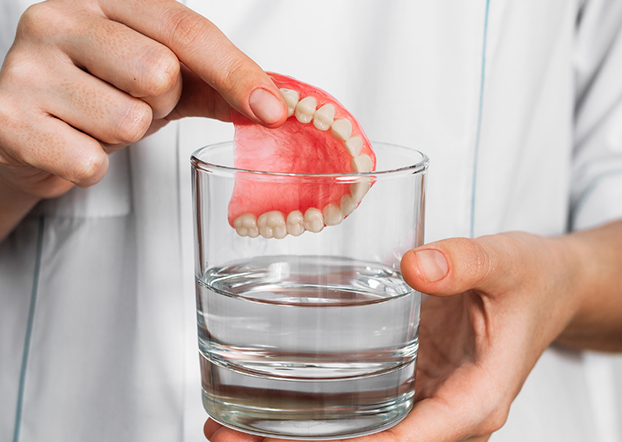Denture Care

Care for your dentures
Taking care of your dentures is crucial for maintaining good oral health. It is important to clean your full or partial dentures daily to remove bacteria and prevent stains. Regular care will help keep your mouth healthy. We provide a guide on caring for dentures and ensuring your mouth stays in good condition.
If you need personalized advice on your denture care routine, feel free to contact Cedar Grove Dental Group at (973) 857-0567. Our experienced team is dedicated to serving patients in Cedar Grove, NJ and the surrounding areas.
Learn about Dental Crowns
- Safely remove dentures after eating: The University of Michigan recommends removing dentures over a towel or a sink filled with water to prevent damage. Dropping dentures even from a short height onto a hard surface can cause them to crack or break.
- Rinse and brush dentures with soft bristles and no toothpaste: Rinse dentures under running water to remove plaque and food particles. Use brushes and cleaners specifically designed for dentures. Hand soap or mild dishwashing liquids are acceptable, but avoid household cleaners as they can damage dentures. Never use toothpaste, as it is too abrasive. After rinsing, apply cleaner to the brush and gently scrub all surfaces of the dentures. Brushing too hard can alter the plastic shape and affect metal attachments.
- Soak dentures in cool water or solution overnight: Dentures should be placed in cool water, as warm water can warp their shape. According to the American Dental Association (ADA), dentures must remain moist at all times. Some dentures should only be placed in water, as solutions can dull metal attachments. If a solution is advised, popular brands include Efferdent®, Polident®, and Retainer Brite®. We can recommend the best option for your daily denture care.
- Brush your teeth and gums with a soft-bristled brush: Caring for partial dentures requires regular flossing and brushing of natural teeth. For full or partial dentures, brushing your gums and tongue stimulates circulation, which is especially important after affixing dentures in the morning. Regularly massage and rinse your mouth with salt water when dentures are removed.
- Thoroughly rinse off denture solution before placing them back in the mouth: Dentures should be rinsed to avoid ingesting any solution. According to the U.S. Department of Health & Human Services, swallowing denture solution can cause irritation, swelling, or breathing difficulties.
“In many cases, caring for implant dentures will be the same as taking care of permanent teeth with brushing twice a day.”
A Dentist's Guide to Treating Your Denture Needs
It is important to regularly visit a dentist even if you have lost all your teeth. A dentist can provide advice on the proper care and cleaning of dentures. Patients with dentures should schedule appointments every six months, unless otherwise recommended by a dentist. Dentists can also check for signs of oral cancer, clean your teeth, and ensure your dentures fit properly.
As time goes on, you may need adjustments or repairs to your dentures. Follow-up appointments are usually scheduled after receiving dentures for any necessary adjustments. If your dentures are damaged in any way, such as breaks, chips, cracks, or loose teeth, it is important to contact a dentist right away. Most repairs and adjustments can be done on the same day, but more complex maintenance may require a specialist. Typically, dentures last five to ten years before needing replacement, although they may need to be replaced sooner in some cases.
It is important to contact a dentist right away if your dentures are broken, chipped, cracked, or have a loose tooth.
Denture Care at Home
Please do not try to adjust or repair your dentures on your own. Using DIY kits can cause permanent damage to your dentures and harm your oral health. Household glues should never be used as they may contain harmful chemicals if swallowed. The U.S. FDA advises against excessive use of denture adhesives and recommends using them only as a temporary solution for loose dentures. Some denture bonding products contain Zinc, which can lead to health issues if used excessively. When used responsibly, you can choose from a variety of denture adhesives like Fixodent® Original, Super Poligrip®, and DenTek® Secure. For more information on denture repair or adjustment, please contact us to speak with a qualified professional.
Maintaining good oral hygiene and regularly cleaning your dentures can help reduce the need for frequent dental visits. When cleaning partial dentures, be sure to clean the teeth under the metal clasps thoroughly as plaque tends to accumulate there. Avoid using whitening toothpaste on natural teeth and never use products with bleach on your dentures as it can damage the metal attachments. Eating a balanced diet also contributes to a healthy mouth. For more helpful tips on denture care, reach out to one of our Cedar Grove Dental Group dentists.




